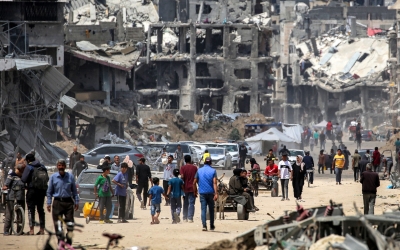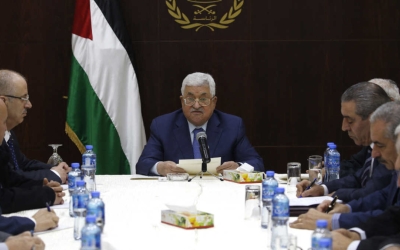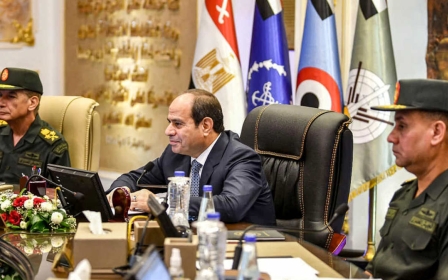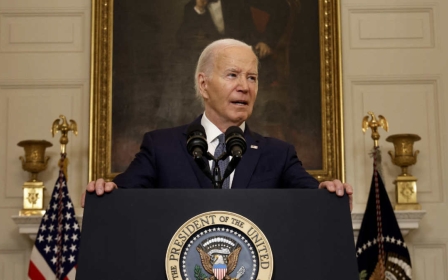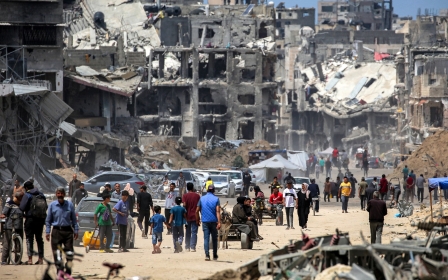US weighs plan for Centcom to coordinate directly with Palestinian Authority's security forces
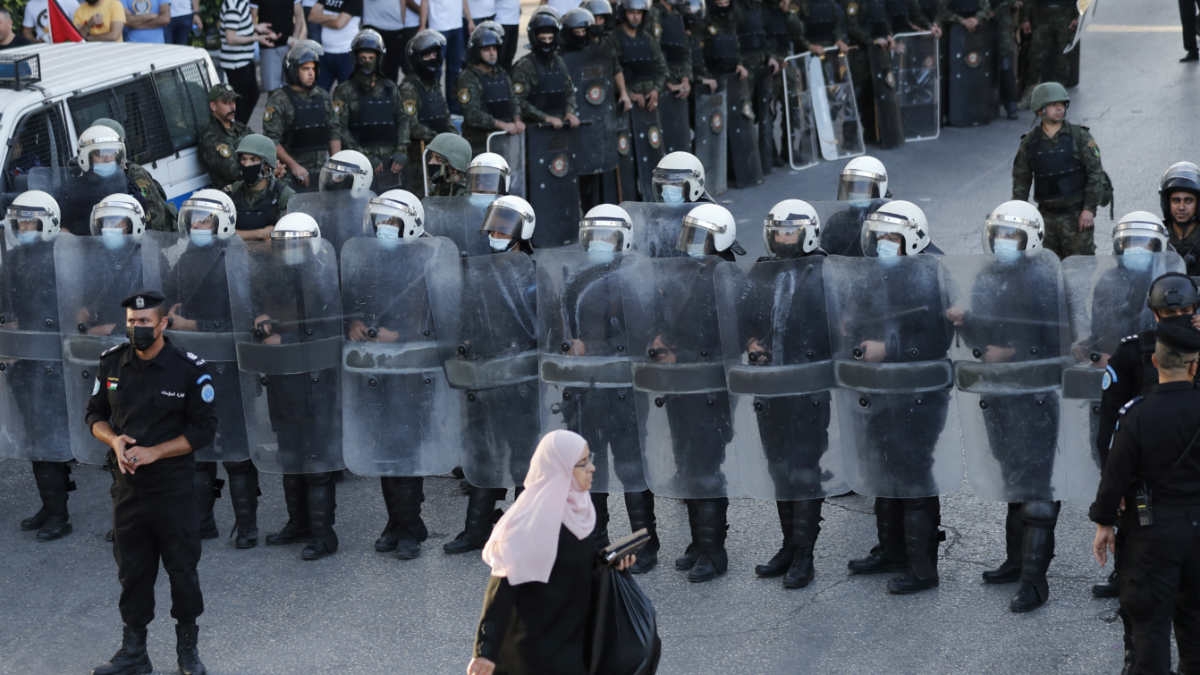
US President Joe Biden's administration is weighing a plan to bring cooperation with the Palestinian Authority's security forces under the purview of Centcom, a potential reshuffle that some US officials say could advance plans for post-war Gaza governance.
US officials advocating for the move argue it would bolster cooperation between the Palestinian Authority's (PA) security forces and Arab states, one current US official, one former US official and one Western official familiar with the plan told Middle East Eye.
Proponents of the idea cite the US decision to place Israel under the responsibility of Centcom in 2021. The decision to link Israel with the US’s overall military command for the Middle East was intended to better integrate Israel with the US's Arab allies and deepen intelligence sharing.
The Biden administration has approached its Arab allies to send peacekeepers to Gaza until the PA is in a position to take over security, MEE previously reported.
The US Security Coordinator (USSC) for Israel and the Palestinian Authority was created in 2005 to train PA security forces and foster coordination with Israel. The Jerusalem office is tied to the US State Department, but its chief is a US lieutenant general.
New MEE newsletter: Jerusalem Dispatch
Sign up to get the latest insights and analysis on Israel-Palestine, alongside Turkey Unpacked and other MEE newsletters
Separately, US intelligence agencies, mainly the CIA, play a leading role in coordinating with the PA. The cooperation underlines the PA's history of dealing with spies over soldiers. Its legacy is traced back to CIA officer Robert Ames's creation of a backchannel to Fatah security chief Ali Hassan Salameh in the 1970s. During the Second Intifada, CIA Director Bill Tenet played a leading role mediating between the PA and Israel.
'The day we take power'
The idea to place defence coordination within Centcom's area of responsibility was floated by former US officials at a post-war Gaza planning event in May hosted by the Rockefeller Foundation and Middle East Institute. It has since attracted interest within the Biden administration, the current and former US officials told MEE.
The US Security Coordinator currently has no purview over Gaza, which has been ruled by Hamas since 2007 after the movement swept to power in Palestinian legislative elections the year before.
'Some [Arab states] have said: why don't you just parachute in Paul Bremer?'
- Senior Western official
Shortly after, fighting broke out between Hamas and Fatah, its secular rival that dominates the PA. Hamas consolidated its hold in Gaza, and the PA in the occupied West Bank. The US has designated Hamas as a terrorist organisation.
According to the US official, this plan would first see Centcom take over responsibility for security ties in the occupied West Bank. Once the Palestinian Authority Security Services move into Gaza, then the force operating in the Mediterranean enclave would be included.
In a statement to MEE, Pentagon spokesperson Sabrina Singh denied that the Pentagon is considering shifting the Palestinian Authority's security forces under Centcom.
While the US does not recognise an independent Palestinian state, Centcom already coordinates with other armed groups that do not have a state like the Syrian Democratic Forces.
The Biden administration says it wants the PA to assume governance of Gaza. PA President Mohammad Mustafa said in May that the PA was "prepar[ing] for the day we will be in power in Gaza".
Coming up with a plan to secure Gaza once Israel's bombardment of the enclave stops is shaping up to be an onerous task.
'Parachute in Paul Bremer'
Nearly 80 percent of Gaza's population is displaced, with hundreds of thousands sheltering in squalid refugee camps. The enclave is on the verge of famine, aid workers warn. Israel has also targeted and killed Hamas police officials in Gaza, some of whom have been responsible for securing aid shipments.
The Biden administration estimates it would take about 10 months to train 6,000-8,000 PA forces to maintain security in the Gaza Strip, the current US official told MEE.
'The politics of sending the PA to Gaza don't point to any stable outcome'
- Yezid Sayigh, Carnegie Middle East Center
In the meantime, the Biden administration has floated multiple proposals including an Arab peacekeeping force that can maintain security in Gaza until the PA can step in, and later work alongside them.
The US asked Morocco, the UAE and Egypt to participate in the multinational force, according to the Financial Times. MEE reported that Bahrain, considered a protege of Saudi Arabia, expressed its willingness to join the force. Bahrain normalised ties with Israel in 2021 through the so-called Abraham Accords.
But the US vision of the plan, which calls for a multinational force being run out of Cairo by a senior US official has received pushback from other Arab states, including Egypt, a Western official told MEE.
"Some [Arab states] have said: 'why don't you just parachute in Paul Bremer?'" the senior Western official said, making a reference to the US leader of the Coalition Provisional Authority (CPA) following the US invasion of Iraq in 2003.
"The Biden administration has explored all kinds of options for post-conflict stabilisation, but they are all thought experiments and run into political problems, first of all, starting with the PA," Aaron David Miller, a senior fellow at the Carnegie Endowment for International Peace and former Middle East negotiator, told MEE.
"All of these ideas are conceptual and based on a set of circumstances in Gaza that don't exist now and probably won't exist for the foreseeable future."
In May, the Arab League backed sending a multinational force to Gaza, but said it should also include the occupied West Bank and serve under a UN Security Council mandate.
The US and Israel both oppose internationalising the conflict in such a way. Israel regularly criticises the UN peacekeeping force that has been at its border in Lebanon since the 2006 war with Hezbollah.
Israeli Prime Minister Benjamin Netanyahu has also opposed the PA's return to Gaza and ruled out concrete steps to achieve the creation of an independent Palestinian state, which the PA and Arab states say is necessary for their buy-in to a post-war plan for Gaza.
The PA's unpopularity among Palestinians is perhaps the biggest challenge.
"It's not about technical capacity. It's about the politics. And the politics of sending the PA to Gaza don't point to any stable outcome," Yezid Sayigh, an expert on Arab militaries at the Carnegie Middle East Center in Beirut, told MEE.
The idea to dispatch the PA to Gaza also doesn't address the elephant in the room.
Disarming Hamas
In a speech on May 31, Biden unveiled a three-phase ceasefire proposal that he said would not allow Hamas to "rearm", but Biden didn't explicitly address disarming Hamas.
Despite taking heavy casualties, Hamas has endured eight months of Israeli attacks, and its military wing, the Qassam Brigades, is still putting fighters in the field. Its top military leaders remain alive.
Reuters reported on Wednesday that Fatah and Hamas are set to hold talks in Beijing later in June to reconcile their divides. Previous talks have failed.
On Wednesday, senior Hamas official Basem Naim told Reuters that the group wants the PA to establish a technocratic government in Gaza.
"Whether Hamas is in the government or outside it, that is not a prime demand of the movement and it doesn't see it a condition for any reconciliation," Naim told Reuters.
Any involvement of Hamas fighters in the PA security forces could pose serious problems not just for Israel, but Washington. In 2022, the US said it provided $45 million in security sector support to the PA.
In the wake of 7 October, Democratic Senator Jon Ossof and Republican Senator Lindsey Graham co-sponsored a bill to provide an additional $10 million in funding to the US Security Coordinator's office. However, many pro-Israeli Republican lawmakers oppose the PA.
Sayigh said moving the Security Coordinator's office to Centcom "would have far more political significance than operational" and could face pushback in the US.
The White House and State Department didn't respond to MEE's request for comment by the time of publication.
'Third front'
The 1990s Oslo peace accords which established the PA denied it the right to have a traditional army. Instead, it has a paramilitary force and intelligence services.
The security forces have been unable to prevent a surge of Israeli settler attacks. Since 7 October, Israeli settlers have operated with impunity in the occupied West Bank killing at least 17 Palestinians and displacing over 1,200, according to the UN.
'Whether Hamas is in the government or outside it, that is not a prime demand of the movement and it doesn't see it a condition for any reconciliation'
- Basem Naim, Hamas political bureau
The 88-year-old Palestinian president, Mahmoud Abbas, and his inner circle are deeply unpopular in the occupied West Bank and are widely viewed as corrupt Israeli collaborators. The PA relies on the Preventive Security and General Intelligence Services to snuff out opposition, a former US intelligence official told MEE.
But amid an outpouring of anger at Israel over its war on Gaza, and calls by Hamas for an uprising against Israel in the occupied West Bank, the PA security forces have surprised some Biden administration officials with their ability to keep a lid on tensions, former and current US officials told MEE.
"They have shown a surprising level of professionalism. The West Bank has not become a third front," the former US official told MEE, referring to the fighting in Gaza and fighting between Hezbollah and Israel along the Lebanese border.
However, Israel has killed over 500 Palestinians in the occupied West Bank since the war started on 7 October.
Middle East Eye delivers independent and unrivalled coverage and analysis of the Middle East, North Africa and beyond. To learn more about republishing this content and the associated fees, please fill out this form. More about MEE can be found here.


